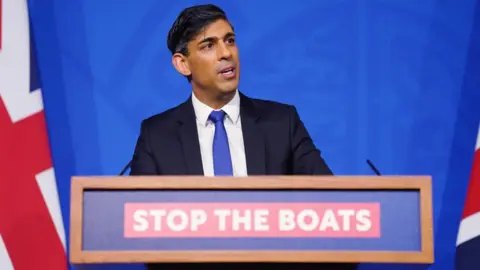Rishi Sunak seeks to defuse Tory revolt ahead of Rwanda vote
 Getty Images
Getty ImagesRishi Sunak is racing to shore up support for his Rwanda bill among right-wing Conservative MPs, ahead of a crucial vote later.
The PM has been meeting potential rebels, as he tries to convince them to back the legislation.
The bill seeks to revive the government's plan to send some asylum seekers to the east African country.
But some on the right of the Tory party say a tougher law is needed to ensure the scheme works.
Danny Kruger and Miriam Cates, who chair the New Conservatives group of Tory MPs, said they could not vote for a bill "that fails to establish the superiority of our democratically-elected UK Parliament over foreign courts".
Writing in the Telegraph, the pair said the draft law did not block off the right to individual appeals over removals and was highly unlikely to ensure significant numbers of migrants were sent to Rwanda before the next election.
They called on the government to come forward with amendments to address its limitations.
Meanwhile, Tory MPs from the more liberal end of the party say they will support it in its current form, but have warned against any changes further down the line, arguing they could breach international law.
It means Mr Sunak is facing the biggest challenge to his authority from his MPs, who could inflict humiliation on the PM over one of his key policies.
MPs are currently debating the bill in the Commons, with a vote due from 19:00 GMT onwards.
The government's legislation has been drawn up to revive the Rwanda scheme, after the Supreme Court ruled it unlawful last month over fears it could lead to human rights breaches.
The legislation seeks to declare in UK law that Rwanda is a safe country to send asylum seekers to, and stop flights being grounded for legal reasons.
The aim of the policy is to deter migrants crossing the Channel in small boats - something Mr Sunak has made a key priority of his government.
However, some Tory MPs are concerned it does not go far enough to prevent further legal challenges derailing deportations.
With Labour and other opposition parties opposing the bill, and with several Tory MPs indicating they could abstain, the parliamentary maths is looking tight for the government.
A bill has not been defeated at second reading since 1986.
Labour leader Sir Keir Starmer says he will scrap the Rwanda plan if his party wins the next election, arguing the £290m due to be given to the east African country as part of the scheme would be better spent tackling people-smuggling gangs.
Ahead of the vote, several senior Tories, including former defence secretary Ben Wallace and attorney general Sir Geoffrey Cox, have called on MPs to unite, warning disunity would spell disaster for the party ahead of the next election.
The New Conservatives group, whom Mr Sunak met for around an hour on Tuesday morning, has said the bill requires "major surgery or replacement".
According to MPs present at the meeting, the prime minister told potential rebels he was willing to discuss "tightening up" the draft law.
Some MPs told Mr Sunak they would abstain or vote against the bill later. However, it is understood others are planning to vote for the bill, in the hope it gets amended further down the line.
The European Research Group (ERG) - another group on the party's right - has argued "very significant amendments" are needed to prevent legal challenges to Rwanda deportations.
The group have not yet revealed how they plan to vote and have been meeting to decide their next steps.
Robert Jenrick - who quit as immigration minister over the legislation last week - said it was "not a bad bill," but needed strengthening to prevent individual claims against deportation.
Speaking in the Commons, he said deportees would "stop at nothing" to avoid being sent to Rwanda, telling MPs: "give them an inch, and they'll take a mile".
However, agreeing to the demands of MPs on the right of the party would risk losing the support of more centrist Tories.
The One Nation group, which includes more than 100 Tory MPs, said it was recommending its members vote for the bill at this stage, but warned it would oppose any future amendments "that would mean the UK government breaching the rule of law and its international obligations".
A defeat of such a key piece of legislation would potentially presage a leadership election for Mr Sunak, perhaps even a general election.
Downing Street said the government was listening to the views of MPs but insisted it would not pull the vote.
Those who want the Rwanda bill to go further argue it could still leave the scheme open to legal challenge by individuals, who could argue deportation to Rwanda would put them at risk of serious harm.
In an attempt to win over critics, the government took the unusual step of publishing a summary of its own legal advice on the scheme.
The advice argues that the grounds for individual challenges to deportation will be "exceptionally narrow" under the bill, and a blanket ban on appeals would breach international law.
It gives examples such as people in the late stages of pregnancy who are unfit to fly or with very rare medical conditions that could not be cared for in Rwanda.
However, critics argue that even if only some of these claims succeed, they would still clog up the courts and delay removals.
